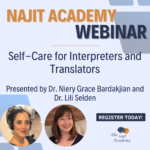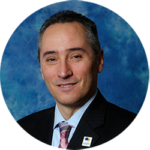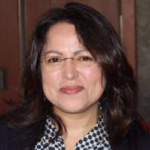
February 2026

Self-Care for Interpreters and Translators
Presenters: Dr. Niery Grace Bardakjian and Dr. Lili Selden
Date: February 21, 2026
Time: 11:00 am-1:00 pm ET
Overview:
T&I professionals in every sphere work under stressful circumstances and rely on their minds and bodies to help facilitate effective communication. The stresses interpreters experience stem from the cognitive load of balancing the need for complete and accurate renditions, on the one hand, and the need to be as inobtrusive and efficient as possible, on the other hand, while also hearing accurately and speaking clearly for hours on end, often with only brief breaks to decompress. Transcribers and translators often sit, hour after hour at a desk, staring at computer screens and typing rapidly to meet rush deadlines. There is also a moderate to high risk of vicarious trauma for interpreters working on assignments involving natural disasters, conflict or injustice of all kinds, debilitating health issues, and so on. It is essential, therefore, for language professionals to continually monitor their mental, emotional, and physical health, and to take care of their “instrument.” During this 120-minute, language-neutral, hands-on webinar, the co-presenters discuss the research documenting symptoms of vicarious trauma in interpreters. They also share best practices for routine self-care, ranging from vocal exercises to ensure healthy vocal cords, accounting for the risk of hearing loss and acoustic shock from unsuitable headsets when interpreting remotely or in the booth, stretches to protects against carpal tunnel and back pain, and prioritizing one’s mental and emotional health both to ensure delivery of reliable services during potentially traumatic assignments and to be able to de-stress afterward. Attendees will learn about, and practice together, a range of vocal, breathing, visualization, and other exercises. Ultimately, this session will equip novice and experienced interpreters with an array of self-care tools to enhance their mental, emotional, and physical wellbeing.
Learning Objectives:
Attendees will learn about the cognitive, physical, and emotional demands placed on their minds and bodies when working as T&I professionals, and ways to allow them to decompress after particularly taxing assignments. Attendees will leave the workshop with tools for maintaining their mental, emotional, and physical health.
Co-Presenter Bios:
Niery Grace Bardakjian (MA in teaching, MBA, and PhD in music) is a conference and liaison interpreter who coaches English, conference interpreting, test preparation (TOEFL, GMAT), and music (piano, singing) in Armenia and online. She is the founder of Grace+ful learning which provides interpreting, translation, and technical support for events. In addition to corporate clients, she interprets for Armenian government, UN, and EU officials, as well as for overseas diplomats posted to Armenia. As a conference interpreter, the topics she has extensive experience in include politics, education, economics, and development. She is also a singer, voice over actor, award-winning choral conductor, and mother of four who is currently studying for the court interpreter oral exam.
Lili Selden (BA in music, MA and PhD in Japanese literature) is a translator, interpreter, academic editor, and intercultural communications coach. Having previously taught Japanese literature and language, she is now a registered court interpreter in multiple jurisdictions and teaches Japanese language, business etiquette, and T&I courses. Since joining NAJIT in 2017, she has volunteered on the Training & Education, Advocacy, and Positions Papers Committees. She is currently a NAJIT board member and a member of the Training & Education committee.
Cost:
FREE
Registration is required to attend
CEUs Offered?: Yes. CEUs are provided for attendance at the live, real-time virtual session on the scheduled date. Certificates of attendance will be provided following the event.
January 2026
Bridging Legal Worlds: Essential Terminology for U.S.-Brazilian Court Interpreters
Presenter: Dr. Nattalia Paterson
Date: January 24, 2026
Time: 11:00 am-2:00 pm ET
Overview:
In court interpreting, precision isn’t just a matter of professionalism—it’s a safeguard for due process. When a single mistranslated term can sway a legal outcome, interpreters must be more than fluent; they must be legally literate across jurisdictions. This workshop offers a comparative exploration of Brazilian and American legal terminology, empowering interpreters to navigate two distinct systems with greater clarity and confidence.
Participants will critically examine high-impact terminology and deceptive false cognates—such as sentence vs. sentença — that can easily derail an interpretation. We’ll unpack system-specific legal concepts like plea bargain, and the polysemous nature of court. Terms will be analyzed in context, highlighting legal philosophies that shape their usage.
To support ongoing professional growth, the workshop introduces concrete research methods for validating legal terminology using credible and system-specific resources. It blends theoretical insight with practical strategies, ensuring participants leave with tools they can immediately apply.
Whether you are a new interpreter seeking a strong foundation or a seasoned practitioner looking to refine your legal vocabulary, this workshop invites you to sharpen your tools, deepen your expertise, and elevate the standard of linguistic access in legal settings.
Learning Objectives:
By the end of this presentation, participants will have gained a clearer understanding of the fundamental structures of the Brazilian and U.S. court systems, recognizing how each is organized and how their institutions compare and diverge. They will gain greater awareness of challenges that arise when navigating legal terminology across these two jurisdictions. In particular, they will learn the risks posed by false cognates such as sentence and indictment and less known “semi” false cognates like request and requisitar, learning to avoid misinterpretation by focusing on functional rather than literal equivalents. Furthermore, attendees will learn key differences between civil and criminal proceedings and will explore the progression of a civil litigation and trial in the American Courts. Throughout the session, emphasis will be placed on the role of context, jurisdictional awareness, and preparation as essential tools for interpreters to ensure accuracy and professionalism in high-stakes settings. Ultimately, the goal is to equip participants with sharper analytical skills, practical resources, and the confidence to navigate the terminological divide between these two complex legal systems.
Presenter Bio:
Brazilian-born Dr. Nattalia Paterson is a certified court and healthcare interpreter with broad experience as a translator and as a conference and diplomatic interpreter. She holds a Ph.D. in Linguistics from Northwestern University and a bachelor’s degree in Letras (Translation, and Conference Interpretation) from PUC-Rio. Deeply committed to interpreter education, Dr. Paterson trains Portuguese court interpreters as they prepare for state certification examinations and mentors professionals entering the field, helping to build the next generation of qualified practitioners. Alongside her teaching, she contributes to advancing the profession through leadership and advocacy with NAJIT.
Cost:
FREE
Registration is required to attend
CEUs Offered?: Yes. CEUs are provided for attendance at the live, real-time virtual session on the scheduled date. Certificates of attendance will be provided following the event.
June 2024
Translating the Language of Finance: Navigating the World of Financial Markets and Regulation
Presenter: Analia Bogdan
Date: June 8, 2024
Time: NOON ET to 1:30 PM ET / 9 AM PT – 10:30 AM PT
Overview: Analyzing current regulations and challenges specific to the US Hispanic market, this presentation will explore the concepts of different transactional, credit and investment banking products —using a clear and easy approach—, and the challenge of translating them into Spanish for a very regulated banking industry in the US. that is seeking to protect Hispanic banking customers and the very system itself.
Objectives: Provide experienced translators and interpreters (in legal/ courtroom settings and proceedings, specialized publications, administrative purposes) with a review of basic theoretical concept and strategies.
Participants will have a clear understanding of key concepts related to the real economy and the financial markets (including banking industry and capital markets): banking transformation procedures, type of accounts, different financial products.
Participants will also have an awareness of “the best way to go” when translating for this very specific target audience, after reviewing the regulations in force that endeavors to protect Hispanic banking customers and affect the translation/interpretation work we do.
Cost:
$45 for Members
$60 for Non-Members
CEUs Offered?:Yes. Attendees of the live session will receive a certificate of attendance. Review the chart below for approval details by organization.

Presenter Bio: Analía Bogdan is an English<>Spanish translator graduated from the University of Buenos Aires, and a holder of a Master´s Degree in Legal and Financial Translation. She has a graduate course in Capital Markets and was certified as a Mutual Funds advisor in Argentina. She worked in the financial industry for 10 years before becoming a professional translator. Analía was the Administrator of the Finance Division (5 years) of the Buenos Aires Translator´s Association, and was the Treasurer of the Association of Translators and Interpreters of Florida (ATIF). She gave many courses and talks related to finance for translators, and wrote several articles for professional publications in Argentina and the US. She was also a speaker at several ATA Conferences and was awarded the “Marian Greenfield Award” to the best financial presentation in 2022. Analía was granted a permanent residence in the U.S. for her specialization in financial translation.
April 2024
Ditch the Cloak of Invisibility
Presenter: Giovanna (Gio) Lester
Date: April 20, 2024
Time: NOON ET to 1 PM ET / 9 AM PT – 10 AM PT (60 minutes)
Overview:
Being top-of-mind is a relentless job.
Static advertising in newspapers and magazines has lost luster and power. The other options are many and confusing: there is such a thing as too much of a good thing.
This presentation aims to introduce and expand on tools language professionals can use to remain top-of-mind for their clients, establish authority, and attract new clients.
Technology will be front and center in this presentation. The following tools will be discussed:
- Websites
- Mass email platforms – Mailchimp, Zoho, ConstantContact
- Social Media platforms – LinkedIn, Instagram, Twitter
- Design platform – Canva.
Objectives: At the end of the session, attendees should be able to communicate effectively with one’s existing and potential clients by identify their own offerings (Unique Proposition); be able to identify and describe one’s strengths and differentiator (s), create a client persona, select platforms to explore, define their message, define their voice, establish authority on their field.
Cost:
$35 for Members
$50 for Non-Members
CEUs Offered?:Yes. Attendees of the live session will receive a certificate of attendance. Review the chart below for approval details by organization.

Presenter Bio: Giovanna (Gio) Lester’s career started in 1980. She is an advocate for her professions and has occupied various administrative positions in professional associations: President of the Brazilian Association of Translators and Interpreters (ABRATES- 2020-2022), Co-Chair of NAJIT’s Public Relations Committee and Editor of The NAJIT Observer (2016-2020), Assistant Administrator and Administrator of the ATA Interpreters Division (2003-2007), Interim Vice-Chair and Director of the National Board of Certification for Medical Interpreters (2009-2013), Chair of the Miami-Dade College Translation and Interpretation Council (2017-2019). She has been published in the ATA Chronicle, The NAJIT Observer and Proteus, CIOL The Linguist, the CMI Times, and Abrates’ Metáfrase, to cite a few publications, and you can also find her articles on LinkedIn. Gio is a speaker, a mentor, a writer, and the VP of Public Relations at West Kendall Toastmasters.
March 2024
March
Tax Prep 101 for Service Based Sole Proprietors – Knowledge and Tools to Empower
Presenter: Rachel Weil, Enrolled Agent
Date: March 16, 2024
Time: 1 PM ET to 3:00 PM ET / 10 AM PT – NOON PT (120 minutes)
Overview:
Tax Deductions, Best Accounting Practices and More for Service-Based Sole Proprietors, including the often-asked “to be or not to be S-Corp” question. A comprehensive and detailed presentation with 15 min Q&A’s period at the end. Attendees will come away understanding the following: The “why, when, where and how” of ALL the different possible business-related deductions; the best way to keep income and expense records; how to determine estimated tax payment amounts; what high-deductible health plans and the related HSA (health savings account) are; retirement plan options; the necessity of having (or desire to have) an EIN; Entity choices (sole proprietorship vs LLC vs S-Corp vs C-Corp); 1099-NEC’s – when to issue or be issued. Each attendee will receive a pre-made Income & Expense Report Excel template customized for interpreters/translators, created by the presenter.
Objectives: Attendees will come away understanding the following: The “why, when, where and how” of ALL the different possible business-related deductions; the best way to keep income and expense records; how to determine estimated tax payment amounts; what high-deductible health plans and the related HSA (health savings account) are; retirement plan options; the necessity of having (or desire to have) an EIN; Entity choices (sole proprietorship vs LLC vs S-Corp vs C-Corp); 1099-NEC’s – when to issue or be issued.
*NOTE: Participants must attend the entire live webinar to receive a certificate of attendance.
Cost:
$45 for Members
$60 for Non-Members
CEUs Offered?: Continuing education hours were not submitted for this webinar. A certificate of attendance will be sent to those who attend the live webinar.

Rachel Weil: 2023 marks my tenth year working as a tax preparer and my fifth full year as an Enrolled Agent in business for myself. My gravitation toward the field of tax preparation began in 2011, long after pocketing many a life experience, in the U.S. and abroad, and THAT is a good thing, for both my clients and for me. After graduating from Cal State Chico in 1991, I did not put down roots in any one continent or career until after being married and having kids in the 2000’s. Even then we switched resident countries, from my husband’s native Spain to here, my native SF Bay Area. The common threads throughout all my previous academic and career endeavors were writing, language interpreting, teaching, guiding and admin – the consequential skills of which lent themselves well to the field of tax research, discourse and preparation. Apart from being a spouse, parent of two teens and a tax preparer, I am an art, garden and nature enthusiast, and dancer in my own kitchen.
December 2023
December
I’ll Swear to That! The ABCs of Swearwords in Legal Settings
Presenter: Mary Aponte
Date: December 16, 2023
Time: 12:00 Noon ET to 1:30 PM ET / 9:00 AM PT – 10:30 AM PT (90 minutes)
Overview: Swearwords have long been and will continue to be a vital part of our lexicon in many languages. Researchers, however, have only recently delved into this provocative topic. Swearwords serve an interesting and unique purpose in language and yet discussion of them is often avoided by interpreters due to personal, cultural and religious reasons. This session explores the history of swearwords in English and how swearwords originate, develop and eventually become obsolete. While focusing on the best way to choose an equivalent swearword when interpreting for a speaker, attendees will also come to appreciate social and cultural nuances of swearwords and the intriguing way they change over time. By engaging in activities in breakout sessions, attendees will also gain confidence about how to render swearwords appropriately when encountering them in the courtroom and elsewhere. This language-neutral session will be conducted in a respectful and educational manner.
Objectives: The key objective of this session is to empower attendees to become comfortable and confident in their interpretation of swearwords in legal settings. This is a dynamic, language-neutral session in which attendees will identify and evaluate their personal swearword vocabulary in their source and target languages through timed word association tests. During small group exercises and role play, attendees will share cultural and regional swearword knowledge and hone their ability to choose an appropriate swearword in context.
Cost:
$45 for Members
$60 for Non-Members
CEUs Offered?: Yes, see the chart below for details.

Mary Aponte holds a bachelor’s degree in Latin American Studies from the University of New Mexico and a Professional Certificate in Legal Interpretation and Translation from the University of California. After moving to Puerto Rico in 1997, where she worked as a contract translator for Banco Popular, Mrs. Aponte and her family moved to Florida in 2002. In 2012, she achieved her Florida State Certification in Spanish. She has been a staff interpreter at the Thirteenth Judicial Circuit for the last nine years. Mrs. Aponte wrote, researched, and developed several workshops for court interpreters, which she has presented in person and virtually. She is passionate about court interpreting and strives to accelerate her language learning and professional life at all times, while teaching and training prospective interpreters to do the same. In her free time, she enjoys watching rom-coms from Spain with her husband, hiking and volunteering at ZooTampa.
What Would You Do if…? [ETHICS]
Presenter: Athena Matilsky
Date: December 7, 2023
Time: 8:00 PM ET to 9:00 PM ET / 5:00 PM PT – 6:00 PM PT (60 minutes)
Overview: What should an interpreter do if a judge or a witness asked them not to interpret something? What if the interpreter knew the litigant was lying? What if the interpreter’s actions could seriously impact somebody else’s future? In this workshop, attendees will compile their real-life ethical dilemmas. Everyone will refamiliarize themselves with the NAJIT Code of Ethics and Professional Responsibilities, and explore strategies for ethically fulfilling interpreter obligations in various settings. Attendees will leave this 60-minute, language-neutral workshop armed with tools and strategies for real-life ethical decision making. See everyone there!
Objectives: Attendees will read through and discuss NAJIT’s Code of Ethics and Professional Responsibilities for court interpreters, then examine how to apply elements of the Code to some of the ethical conundrums routinely encountered by interpreters within the US legal system. Attendees will leave the webinar with a better understanding of how the Code guides interpreter conduct in the courtroom or jailhouse, and at mediation sessions, depositions, and so on.
Cost:
$35 for Members
$50 for Non-Members
CEUs Offered?: Yes.

Athena Matilsky is a “geek” court interpreter with over a decade of experience in the field. She provides interpreting and translation services in Spanish, English and French. She also has spent years studying interpreting technique, culminating in her Master’s Degree in Conference Interpreting from Glendon College. She now teaches at Glendon. She also owns Athena Sky Interpreting, where she offers Continuing Education courses. She has helped prepare numbers of interpreters to pass medical, legal and conference interpreting exams at the state and national levels. Additionally, she has been a regular contributor for the NAJIT Observer and has served as the editor for Proteus, NAJIT’s quarterly bulletin.
August 2023
Elevate Your Image as an Interpreter in Court and Elsewhere
Presenter: Beatriz E. Bogard, U.S. Courts Certified Interpreter and Certified Image Consultant by The London Image Institute
Date: August 12, 2023
Time: 1:00 pm ET to 2:30 pm ET / 10 am PT – 11:30 am PT (90 minutes)
Overview: Have you ever wondered what your image says about you? Your image includes not only the clothes you wear but your body language, communication skills, and etiquette. Your image needs to say that you are effective professionally and personally; it should reflect your accomplishments. Did you know that it only takes a few seconds for others to make judgments about you? We make judgments about others based purely on appearances, and it all happens at a subconscious level. Clearly, since we make such profound value judgments from such superficial evidence, it would also seem important to carefully choose the way we dress to communicate our attributes and value to others. In this class we will learn the importance of our image in our work as interpreters and how we can elevate it to be used as a tool to communicate efficiency and professionalism. Attendees will also receive great tips on how to use color to our advantage in different professional settings.
Objectives: To learn the importance of our work as interpreters. To learn how to dress appropriately for different court settings, in a way that communicates knowledge, confidence, and professionalism. How to make a good first impression.
- The three main elements of a good image.
- The level of formality in the different court settings.
- Depositions, conferences, medical clinics, etc.
- Tips for freelance interpreters
Cost:
$35 for Members
$50 for Non-Members
CEU’s: CE credit was not requested. Some states have approved this webinar for credit. Every attendee of the live session will receive a certificate of attendance.

Beatriz Bogard is originally from Veracruz, México, and came to this country almost 30 years ago. She’s a Federally Certified Spanish Interpreter with over 22 years of experience as a court interpreter. Seven years ago, she felt the need to do something creative and started studying fashion and jewelry design, and fashion styling. She then became a Certified Image Consultant by the London Image Institute in Atlanta, GA. In 2020, she founded Bogard House of Style, Image Consulting and opened her studio in Phoenix, Arizona. She helps people find their true style and elevate their image to succeed in their professional careers and personal lives. She advises clients on Color Analysis and Image, which includes wardrobe, hair, and makeup, as well as communication skills, behavior, and etiquette. Beatriz is also a keynote speaker and instructor, doing image workshops and presentations in English and Spanish. She’s a full-time staff interpreter at the U.S. District Courts in Phoenix.
February 2023
Introduction to Court Interpreting for Japanese Interpreters: Skill Building and the Code of Ethics
Presenter: Lili Selden, PhD
Date: February 25, 2023
Time: 1:00 pm ET to 3:00 pm ET / 10 am PT – 12:00 pm PT (120 minutes)
Overview: This 120-minute, Japanese-specific webinar (the first in NAJIT history!) is designed for highly proficient bilinguals and newly professional translators and interpreters who wish to acquire and build on the core skills and mindset necessary for becoming a successful legal interpreter. In particular, we will focus on practicing, constructively self-assessing, and refining our technique for stellar delivery of the three modes of court interpreting (consecutive and simultaneous interpreting, and sight translation). We will warm up with some essential drills (such as expanded sequence, shadowing, dual-tasking, and chunking), then practice some brief role-play scenarios in small groups and learn how to offer precise, constructive feedback to each other and ourselves so we can improve whether we have study partners or not. We will also familiarize ourselves with the NAJIT Code of Ethics and Professional Responsibilities, as that will guide and protect us in the course of providing linguistic support as officers of the court. Attendees need to bring a recording device (e.g., a smartphone), lined notepad (plain paper in a pinch), and pencil or pen.
Objectives: Attendees will learn the most optimal practice techniques for acquiring and retaining our technical skills as court interpreters. We will break down the component technical skills required for the interpreting and sight translation tasks performed by judiciary interpreters, and will practice those component skills (memory-building, shadowing, dual-tasking, chunking, etc.) together. We will also read through and discuss NAJIT’s Code of Ethics for court interpreters (each state judiciary has a slightly different Code) to better understand some of the ethical conundrums we routinely encounter in our role as conduits for communication between languages.
Cost:
$45 for Members
$60 for Non-Members
CEU’s Offered: Yes. Attendees of the live session will receive a certificate of attendance.

Lili Selden, PhD, is a freelance translator and interpreter who teaches Japanese language, culture, and business etiquette in the private and federal sectors. A registered court interpreter in several jurisdictions, she has served as a contract interpreter for academic and corporate clients, volunteered on the NAJIT Training & Education Committee for four years, and designed and taught introductory translation and interpreting courses for advanced Japanese speakers. As a member of the National Language Service Corps, she has supported the COPE North trilateral disaster relief exercises annually since 2020.
August 2022
“4 Years in Jail”: Interpreting in 4 Different Contexts (target language: Brazilian Portuguese)
Presenter: Jaqueline Neves Nordin
Date: August 20, 2022
Time: 1:00 pm ET to 3:00 pm ET / 10 am PT – 12:00 pm PT (120 minutes)
Overview: This 120-minute, Portuguese-specific workshop focuses in part on some core tools of professional interpreters, then applies them in role-play scenarios in four different contexts, including both legal and court interpreting situations. These tools involve the linguistic skills required for exceling in the profession as well as stress management strategies that are equally important to master, especially when dealing with trauma-informed interpreting assignments. Attendees need to bring a recording device (e.g., a smartphone), lined notepad (plain paper in a pinch), and pencil or pen.
Objectives: Attendees will learn why it is important to distinguish between legal and court interpreting, and how that distinction may affect our work as interpreters in different settings. We will also discuss the similarities and differences between the legal and community interpreter Codes of Ethics, and how that impacts the ways in which we intervene and mediate during interpreting sessions. We will practice some simulations using prepared scripts. Our final topic is self-care in response to the secondary trauma we may experience when interpreting for patients, witnesses, and others who have experienced violence and other traumas.
Cost:
$45 for Members
$60 for Non-Members
CEU’s Offered: Yes. Attendees of the live session will receive a certificate of attendance.

Jaqueline Neves Nordin, author of the first book in Portuguese about judiciary interpreting, Introdução à Interpretação Forense no Brasil, is a freelance translator and interpreter. She has taught, coordinated and developed Interpreting programs at various federal universities in Brazil, including two programs for indigenous language interpreters. She has personally designed all of the teaching material used in these programs. A senior court interpreter in several jurisdictions, she has served as ad hoc interpreter for many years in Brazil and now remotely, and she has served on the NAJIT Training & Education Committee since its inception.
July 2022
The Professional Toolkit of a Judiciary Interpreter: Essential Skills and “The Ninja Package”
Presenters: Jaqueline Neves Nordin and Lili Selden, PhD
Date: July 30, 2022
Time: 1:00 pm ET to 2:30 pm ET / 10 am PT – 11:30 am PT (90 minutes)
Overview: This 90-minute, language neutral webinar will be presented in English. It introduces highly proficient bilinguals and newly professional interpreters to essential concepts and exercises for developing the mindset and technical skills of a successful judiciary interpreter. We will practice foundational skills (such as shadowing and dual-tasking) that will eventually lead to solid consecutive and simultaneous interpreting technique. We will then learn about concepts and strategies (such as developing an awareness of unconscious bias, assessing when and when not to mediate) for training ourselves to be as discreet, reliable, and impartial as possible in the high-stakes assignments that occur in jails, courthouses, attorneys’ offices, and so on. Attendees need to bring a recording device (e.g., a smartphone), lined notepad (plain paper in a pinch), and pencil or pen.
Note: This interactive webinar will be followed by language-specific webinars with more in-depth exercises for LOTS (Languages Other Than Spanish) interpreters to improve their skills. In the pipeline are webinars in Japanese and Portuguese, respectively, and we are hoping for other languages to come.
Objectives: Attendees will learn about the role of legal interpreters at court and elsewhere, both from a technical and ethical standpoint, and will be introduced to some of the most effective study materials, resources, and certification/degree programs in the US, Canada, and Europe. We will then break down the component technical skills required for the interpreting and sight translation tasks performed by judiciary interpreters, and will practice those component skills (shadowing, dual-tasking, chunking, etc.) together. In the next portion of the webinar, we will focus on the concept of unconscious bias and how an awareness of our biases can help ensure that we are always respectful in our interactions, whether at court or a police station, in jail or at the hospital. We will also discuss how and when to intervene during court hearings, after which we will practice some simulations using prepared scripts.

Jaqueline Neves Nordin, author of the first book in Portuguese about judiciary interpreting, Introdução à Interpretação Forense no Brasil, is a freelance translator and interpreter. She has taught, coordinated and developed Interpreting programs at various federal universities in Brazil, including two programs for indigenous language interpreters. She has personally designed all of the teaching material used in these programs. A senior court interpreter in several jurisdictions, she has served as ad hoc interpreter for many years in Brazil and now remotely, and she has served on the NAJIT Training & Education Committee since its inception.

Lili Selden, PhD, is a freelance translator and interpreter who teaches Japanese language, culture, and business etiquette in the private and federal sectors. A registered court interpreter in several jurisdictions, she has served as a contract interpreter for academic and corporate clients, volunteered on the NAJIT Training & Education Committee for four years, and designed and taught introductory translation and interpreting courses for advanced Japanese speakers. As a member of the National Language Service Corps (NLSC), she has supported the COPE North trilateral disaster relief exercises annually since 2020.
Cost:
$35 for Members
$50 for Non-Members
CEU’s Offered: Yes. Attendees of the live session will receive a certificate of attendance.
March 2022
Solving the Mystery: Impartiality, Confidentiality & Burden of Proof
Presenter: Tony Rosado
Date: March 19, 2022
Time: NOON – 1:30 PM ET / 9:00 AM – 10:30 AM PT (90-minutes)
Overview: From day one, court interpreters are told their job must always be impartial; they are taught that everything they do as court interpreters is confidential, and during their interpreter orientations they hear that the burden of proof in criminal cases is beyond reasonable doubt. Many interpreters practice their profession for years under these assumptions, without ever going beyond what they learned from non-legal experts, even when these concepts keep them from truly understanding what they do for a living. Tony will debunk these myths that are keeping you from getting to the next level, where you can work with a different type of client. He will explain, analyze, and give examples showing that interpreting in legal settings need not always be impartial; confidentiality is not required in many scenarios, and interpreters can share what they learned in confidence under certain circumstances. Those attending this session will also understand the concept of burden of proof, and will learn what is required to demonstrate a fact in a criminal case. The concepts you learn during this webinar will set you apart from others and will make you the sort of interpreter attorneys want to hire.
Objectives: This webinar will clarify the interpreters’ ethical obligations to maintain confidentiality and impartiality according to the type of interpretation and the text of the law. Those attending will clearly understand the concept of burden of proof in the legal system and be able to dissipate myths about the burden needed in civil, criminal, and administrative cases. At the end of the session, all attendees will have a better understanding of these ethical obligations in light of the legal system, will differentiate these duties according to the different types of interpreting, and will better understand all court proceedings from the perspective of those with the burden to prove the facts of a case.

Tony is a high-profile conference interpreter with over 30 years of experience as an instructor of interpreters. He has worked all over the world and has given conferences at colleges and universities in all continents. Tony is an independent contractor at the Conference Level for the U.S. Department of State, has a Law Degree, and among other credentials, he holds a court interpreter federal certification in the United States. Tony writes the popular blog “The Professional Interpreter” and is a member of NAJIT, AIIC, TAALS, IAPTI, ASETRAD and other professional associations.
Cost:
$35 for Members
$50 for Non-Members
CEU’s Offered: Yes. Attendees of the live session will receive a certificate of attendance.
February 2022
How Bilingual Are You?
Presenter: Prof. Karen Borgenheimer, MFA
Date: February 26, 2022
Time: 1:00 PM – 3:00 PM ET / 10:00 AM – Noon PM PT (2-hours)
Overview: This interactive 2-hour language-neutral webinar kicks off with an introduction to Language Acquisition at different stages in life from childhood through adulthood. The presenter will thoroughly examine the various levels of register from a linguistic point of view (childhood, social, and educated).
The instructor will then introduce the INTERAGENCY LANGUAGE ROUNDTABLE (IRL) and explain the IRL Language Proficiency Guidelines accepted by all federal government agencies and used as a primary reference in different government tests of language ability.
Using the IRL scale, participants will complete an introspective self-evaluation of the four (4) language skills areas: Reading, Listening, Writing, and Speaking in their language pair. Individual findings will be shared with the group. During the final discussion, participants will strategize how to bridge their particular “language gaps” and become balanced bilinguals.
Objectives: Participants will discover what is truly meant by “Balanced Bilingual” based on language acquisition from a linguistic point of view. Upon completing an introspective self-evaluation based on language acquisition, participants will obtain a new perspective on their bilingualism. Having completed this language assessment, attendees will identify their strengths and weaknesses in their language pairs. Through a discussion of “bridging language gaps” participants can establish a realistic training goal to attain the “Balanced Bilingual” level of language acquisition.

Prof. Karen Borgenheimer, MFA, is a classically trained, certified interpreter and translator who is regarded as a skilled, insightful, and versatile professional who is equally comfortable in the classroom, courtroom, and international conference where she has interpreted for heads of state, diplomats, the Department of Defense and Homeland Security and Fortune 500 companies. Her Interpreter Training Workshops have been a huge success in the US and Spain. Over the past 20 years, she has trained hundreds of certified interpreters and interpreters-in-training. Karen is the owner of the Florida-based company InterpreterTranslation.com, LLC.
Karen has been a university professor for 30 years and a professor in the Translation and Interpretation Program at Florida International University (FIU) in Miami, Florida, for the past 20 years. She has presented at national and international conferences, including ATA-SPD, NAJIT, ATI, and CUICIID 2018 “Docentes de Vanguardia” in Madrid, Spain.
Cost:
$45 for Members
$60 for Non-Members
CEU’s Offered: Yes. Attendees of the live session will receive a certificate of attendance.
December 2021
Preparation and Mindset
Presenter: Javier Castillo, Jr.
Date: December 9, 2021
Time: 7:30 PM – 8:30 PM EDT / 4:30 PM – 5:30 PM PDT (60 Minutes)
Overview: This 1-hour webinar will offer strategies the language professional can apply to a host of practical situations. The presenter will explore strategies and thought processes within the practitioner’s control that can have a powerful impact on the way unexpected challenges are resolved and the quality of the end product, whether it be a new translation, a new interpreting assignment, your next certification exam, or having to pivot due to unexpected circumstances so they can become a source of excitement rather than trepidation.
Learning Objectives: Participants will understand the most common available business structures, identify an appropriate business structure for their business, and know where to turn for assistance to ensure the necessary documents are filed with the appropriate authorities on an ongoing basis. Finally, attendees will understand the value of Errors & Omissions insurance specific to language professionals.
*NOTE: You must join the live webinar and attend the entire session to receive a certificate of attendance.

Javier is president of Castillo Language Services, Inc. in Greenville, NC. He is an interpreter, translator, consultant, trainer and internationally recognized speaker. He is a Federally Certified Court Interpreter, NC AOC certified court interpreter, a Certified Medical Interpreter, (CCHI), conference interpreter and contract interpreter for the U.S. Department of State and routinely interprets for international delegations and high-level speakers across the United States and abroad.
Since 2007, Javier has offered training workshops for court, medical, conference and community interpreters across the United States. He has provided in-house training for staff interpreters at hospitals, Administrative Offices of the Court, and Departments of Social Services.
He has designed and taught courses on working with interpreters in the legal field at Campbell Law School and the UNC School of Law. He’s also taught Continuing Legal Education courses for members of the judiciary.
Javier is a frequent speaker and trainer at national and international conferences. He is the President of the Carolina Association of Translators and Interpreters (CATI), and the Head of the U.S. Chapter of IAPTI (International Association of Professional Interpreters and Translators), and an active member of the American Translators Association and NAJIT.
Cost:
$15 for Members
$40 for Non-Members
CEU’s Offered: CEU’s have not been pre-approved for this session. Attendees of the live session will receive a certificate of attendance.
November 2021
How to Select the Best Business Structure
Presenters: Rob Cruz, CAE, and Susan Cruz, CFP®
Date: November 13, 2021
Time: 1:00 PM – 2:30 PM EDT / 10:00 AM – 11:30 AM PDT (90 Minutes)
Overview: Have you ever wondered if your small business is appropriately structured? If something went wrong, are your personal assets protected? These are common questions small business owners have. This webinar will review the four common business structures for small businesses: Sole Proprietorship, Partnership, Limited Liability Company, and Corporations. The webinar will also discuss the level of difficulty to establish a company under a particular structure, the pros and cons of each business type, and resources available to remain in compliance with both the state and federal government. Participants will also understand how their personal assets may be at risk with certain business structures and how to safeguard themselves from the possibility of professional errors.
Learning Objectives: Participants will understand the most common available business structures, identify an appropriate business structure for their business, and know where to turn for assistance to ensure the necessary documents are filed with the appropriate authorities on an ongoing basis. Finally, attendees will understand the value of Errors & Omissions insurance specific to language professionals.
*NOTE: You must join the live webinar and attend the entire session to receive a certificate of attendance.

Rob Cruz is a Certified Association Executive (CAE). He serves as the Association Management Executive of the National Association of Judiciary Interpreters and Translators (NAJIT), the preeminent judiciary interpreting association. Prior to becoming the Association Management Executive, Rob served on the NAJIT Board of Directors for six years and was the Chairman of the Board for three. He has been a practicing spoken language Certified Court Interpreter in Tennessee since 2004.
Additionally, Rob served on the Language Access and Disability Barriers committee of the Tennessee Supreme Court’s Access to Justice Commission as well as the advisory group “Laying the Path: Creating National Standards for Language Access to State Courts” of the Standing Committee on Legal Aid and Indigent Defendants of the American Bar Association. He is one of two approved providers of the Tennessee Supreme Court’s Ethics and Skills building workshop mandated for all perspective judiciary interpreters in Tennessee and has been qualified as an expert in spoken language interpretation, interpreter ethics, interpreter policy and interpreter protocol in both State and Federal courts.
Rob came to the interpreting and translation profession with extensive experience in sales, sales management, leadership development and training. He owns RCIT, a “single operator” interpreting, translation and consulting company and is the President of Comprehensive Management and Consulting, Inc. (CMAC), a company that offers administrative and consulting services to businesses and non-profit associations.

Susan Cruz, CFP®, is the Vice President of Comprehensive Management and Consulting, Inc. (CMAC), a company that offers administrative and consulting services to businesses and non-profit associations. She is currently the Administrator for the National Association of Judiciary Interpreters and Translators (NAJIT). Susan holds a bachelor’s degree in Business Administration and holds the CERTIFIED FINANCIAL PLANNER™ designation. Susan is a master’s degree candidate seeking a degree in accounting with a specialization in taxation.
Prior to creating CMAC, Susan spent 20 years in the financial services industry. She was responsible for managing a practice of 200 clients with over $200M in investable assets helping families select suitable investments and create an overall strategy for reaching their financial goals. After leaving her practice, she focused on training and coaching seasoned financial service professionals on the financial planning process and the sales process.
Susan has brought her accounting, financial, and training-event planning background together with her husband’s background and professional expertise to create Comprehensive Management and Consulting, Inc. (CMAC), a company that offers administrative and consulting services to businesses and non-profit associations.
Cost:
FREE for Members
$25 for Non-Members
CEU’s Offered: NO
October 2021
The “Basics” for Court Interpreters
Presenters: Janis Palma (NCJIT-S, USCCI) and Hilda Zavala-Shymanik (IL, NY, NJ, & WI State-Certified/Approved Interpreter)
Date: October 16, 2021
Time: 1:00 PM – 2:30 PM EDT / 10:00 AM – 11:30 AM PDT (90 Minutes)
Overview: This 1-1/2 hr. webinar will cover the federal and state court systems, criminal and civil procedures, interpreter protocol in and out of court in legal settings, a description of the interpreting techniques, professional best practices and ethical conduct. Entry level, non-language specific.
Learning Objectives: To familiarize all those considering court interpreting as a career with the structures of the courts, the type of proceedings in which interpreters work most often, general do’s and don’ts for a professional interpreter’s demeanor in and out of court, the knowledge and skills that are required and the ethical framework that guides the profession.
*NOTE: You must join the live webinar and attend the entire session to receive a certificate of attendance.

Janis Palma became a federally-certified judiciary interpreter in 1981, while working as a freelancer in Miami, Florida. She worked briefly as a staff interpreter for the Southern District of Texas in the Brownsville Division shortly after getting federally certified, then freelanced again, mostly for the Southern and Eastern Districts of New York. In 1986 she was accredited by the ATA as a translator into/from English and Spanish, and between 1986-87 worked for the U.S. State Department as a contract escort & seminar interpreter, then again between 2000-2001 while she lived and worked in Washing D.C., where she also freelanced in D.C. Superior Court. In 2002 she joined the District of Puerto Rico as a staff interpreter, where she was appointed Supervisory Interpreter from 2009 to 2015. She retired in 2017 and moved to San Antonio, Texas, where she currently lives with her daughter, son-in-law and 2 of her youngest grandchildren.
Janis Palma joined NAJIT in 1984, served as President during the late 80s and early 90s during the transition from CITA (Court Interpreters and Translators Association) to NAJIT, and is currently a Life Member. She was certified by NAJIT in 2004. She has also served as President of the Society for the Study of Translation and Interpretation (SSTI) Board of Directors, the Board of the Texas Association of Judiciary Interpreters and Translators (TAJIT), and the Asociación Profesional de Traductores e Intérpretes (APTI) in Puerto Rico. During her 29-year career Ms. Palma has published extensively, participated in many professional conferences, taught courses and workshops around the country, and been a rater for federal and state certification examinations. She is still active interpreting in various federal courts, translating for private clients, and volunteering for her state’s professional association, in addition to writing a paper whenever she can to present at a professional conference, or a piece for the NAJIT blog.

Hilda Zavala is a state certified/approved Spanish court interpreter and translator with more than thirteen years of experience in legal, medical, corporate, and non-profit settings in New York, New Jersey, Illinois, and Wisconsin. She is an active and voting member of NAJIT, ATA, the NYCT and other professional groups. She is also former president of the New York Circle of Translators and former board member (director, treasurer), conference committee chair, and advocacy committee member of the National Association of Judiciary Interpreters and Translators. Hilda has two certificates of Legal Interpreting: Spanish/English, the latest one from NYU. Hilda has been a Staff Interpreter at Essex County Superior Court in New Jersey for over 4 years. Born in Chicago, Hilda lived for 20 years in Mexico and loves traveling. She continuously looks for opportunities to promote and advance the interpreting profession.
Cost:
Free for everyone!
CEU’s Offered: NO
May 2021
Webinar Title: Family Court: what to expect when interpreting in it [ETHICS]
Presenters: Tatiana Raineri, CT
Date: May 8, 2021
1 PM ET – 3:00 PM ET (10 AM PT – Noon PT): 120 Minutes
*There is a 15-minute break built into the webinar.
Overview: The Ministry of Justice of BC contracts many interpreters who work with a language other than Spanish (LOTS). This session will provide an overview of the recruitment and evaluation process that interpreters undergo to accept assignments with the Ministry of Justice, the exam they have to pass, and the modes of interpreting required. This webinar’s focus will be on Portuguese Interpreters and one of the Courts that we work most with: Family Court. Interpreters must be mentally, emotionally, and professionally prepared to deal with subject matters that vary from domestic violence to pedophilia, from divorce to shared custody, from meetings with the lawyer to charge of the jury. Get ready for an exciting and informative session that will inform you on what to expect when interpreting in this common setting.
Learning Objectives: Participants will understand the role of a Court Interpreter and its function within the Family Court. They will understand what is expected from them while interpreting, what they are supposed to do and not supposed to do, how to abide by our Code of Ethics, and make sure to preserve their privacy and the clients’ privacy. Additionally, there will be a role play at the end of the session, complete with dialogue, a glossary of terms, and a discussion on our Code of Ethics.

Tatiana Raineri is an Accredited Court Interpreter since 2005, working with the Ministry of Justice of BC. She is also an Accredited Health Interpreter since 2003, working in medical settings and hospitals in the Lower Mainland. She is also an Accredited Community Interpreter, working with Government agencies in the Greater Vancouver Area, and an Accredited IRB (Immigration and Refugee Board) interpreter, rendering over-the-phone and in loco interpreting for the IRB, CBSA (Canadian Border Services Agency and CIC (Immigration and Citizenship Canada) alike. Tatiana holds a BA in Translation and Interpretation from Ibero-America, in Brazil (1991) and is a Certified Translator with CTTIC/STIBC, in good stand. Tatiana also teaches Court Interpreting with the MCI (Masters in Conference Interpreting, with Glendon School of Translation, York University.
Cost:
$15 for Members
$40 for Non-Members
CEU’s Offered: Yes, if approved. A certificate of attendance will be provided to those that join the live webinar and attend the entire session. Please review the list below to determine what states and organizations have approved CEU’s.
March 2021
Unringing the Bell: Can interpreters unknow what they already know?
Presenters: Austin W. Andrews, Carie L. Barrett, and Janis Palma
Date: March 13, 2021
1 PM ET – 3:00 PM ET (10 AM PT – Noon PT): 120 Minutes
Overview:
This is an interactive webinar with three presenters, two ASL interpreters–Austin Andrews and Carie Barrett–and one spoken language interpreter–Janis Palma–, who will explore the different roles and functions of sign and spoken language interpreters in legal settings, and the concept of “bleed”, or how prior knowledge from an interpreting event may or may not interfere with a subsequent interpreting event. The webinar will include breakout sessions in which attendees will explore the concepts addressed by the presenters: (1) how are sign and spoken language interpreter functions the same or different in legal settings? (2) Should interpreters have different functions and therefore compartmentalized access to information in each case, or not? (3) Does prior knowledge of facts in a case affect how the working memory of an interpreter processes and renders the SL message? Presenters will use empirical observations as well as legal frameworks and research components to present the arguments in favor and against long standing practices for sign and spoken language interpreters, for the purpose of initiating a conversation that helps us learn about and from each other.
Learning Objectives:
1- Analyze, compare and contrast the roles sign and spoken language interpreters play in legal settings from a practical and ethical perspective.
2- Evaluate how legal parameters applied to other participants in legal events, e.g., jurors, and Rules of Evidence may have collateral applications to an interpreter’s ability to disregard knowledge about a case acquired at different stages and while working for different sides of a case, i.e., prosecution and defense.
3- Explore the impact of knowledge acquired during interpreted events on an interpreter’s rendition at different and subsequent events within the same case.
4- Consider the applicability of teleological versus deontological ethical principles in light of the general presentation and breakout discussions.
Thank you to the Washington State Administrative Office of the Courts for providing ASL Interpreters for the webinar.

Janis Palma has been a federally certified English-Spanish judiciary interpreter since 1981. She is also certified by NAJIT and licensed as a Master Court Interpreter by the State of Texas. Her experience includes conference work in the private sector and seminar interpreting for the U.S. State Department. She has been an author, consultant, trainer and educator on judiciary interpreting and translation topics in conjunction with various higher education institutions, professional associations, government agencies, and has often been an exam rater for the federal certification examination. Ms. Palma joined the U.S. District Court in Puerto Rico as a staff interpreter in April 2002, was a supervisory interpreter for six years, and retired in 2017. She enjoys volunteering for her professional associations, has been on the SSTI and TAJIT Boards, and is currently a member of the NAJIT Board of Directors.

Austin “Awti” Andrews is an ASL-English Senior Interpreter at the Travis County Court’s Services for the Deaf and Hard of Hearing. Born and raised in Rochester, N.Y., he was the only hearing child in his immediate family—mother, father, brother. He moved to Austin, TX in 2011. His 23 years of experience in the field includes video relay service interpreter, supervisor and national lead trainer for 10 years, translation of frozen texts as part of a 14-person team for 4 years, having his own production company—Awti Productions—as a national and international trainer, entertainer, and YouTube creator for 6 years (www.youtube.com/awti), and being co-founder and member of the Austin Legal Community of Practice. Mr. Andrews holds national CI and CT, NIC Master certifications; state BEI Master, BEI Court certifications; is a graduate of Project CLIMB, class of 2019-2020; a Facilitator-in-Training for class of 2020-2021 (https://www.unco.edu/project-climb/). He is an Affiliate Member of the National Association of the Deaf, the American Sign Language Teachers Association, the Conference of Interpreter Trainers, the Texas Association of the Deaf, the Austin Association of the Deaf, and is a voting Member of the Children Of Deaf Adults (international), the Registry of Interpreters for the Deaf, the Texas Association of Judiciary Interpreters and Transliterators, the Texas Society of Interpreters for the Deaf, and the Austin Area Translators and Interpreters Association. In his own words: “Sign language has been central to my life and work. More recently, I’ve made a deliberate effort to ‘study myself in action with another person’ – my spoken-language counterparts in legal and court settings. This has proven humbling, introspective and unexpectedly rewarding, imbuing my work with greater perspective and power. It’s my great pleasure and honor to share and learn with you at NAJIT!” More details at: https://www.linkedin.com/in/austinandrews/

Carie Barrett is an ASL-English interpreter in private practice with 30 years of experience. She holds a Registry of Interpreters for the Deaf (RID) Certificate of Interpretation/Certificate of Transliteration, and is BEI Master and BEI Court Certified by the Sate of Texas. Ms. Barrett did a double major coursework in American Sign Language and Criminal Justice at the Austin Community College, is an Alumni from the University of Northern Colorado Project CLIMB 2019-2020 class, and is currently a Facilitator-in-Training for the UNCO Project Climb 2020-2021 class. She is a co-founder of the Austin Legal Community of Practice, a member of the Texas Association of the Deaf, the Austin Association of the Deaf, a voting member of the RID, the Texas Society of Interpreters for the Deaf (TSID), Texas Association of Judiciary Interpreters and Translators (TAJIT), and the Austin Area Translators and Interpreters Association (AATIA). Her experience includes 25 years of presenting on various topics that include court and legal settings, ethics and interpreting. In her own words: “I am looking forward to this era of reunification between spoken and sign language interpreters and the insights we can bring to one another. I am interested in exploring how we, together, can provide the best access to the justice system.”
Cost:
$15 for Members
$40 for Non-Members
CEU’s Offered: Yes, if approved. A certificate of attendance will be provided to those that join the live webinar and attend the entire session. Please review the list below to determine what states and organizations have approved CEU’s.
January 2021
Should Professional Interpreters be Required in Police Interviews? The Role of Professional Standards in Interpreter-Mediated Police Interviews
Presenters: Marianne Mason, PhD
Date: January 28, 2021
7 PM ET – 8:00 PM ET (4 PM PT – 5:00 PM PT): 60 Minutes
Overview:
In the NAJIT position paper (2006), “Language Assistance for Law Enforcement,” the authors discuss the important role of using professional interpreters during police questioning of non-native speakers of English. At present, there is no requirement for professional interpreters to provide linguistic mediation in bilingual police interviews. The lack of professional standards in police-lay person interpreting, coupled with fewer available training opportunities for professional interpreters working in police settings, may result in inaccurate interpreting of the Miranda rights, Miranda invocations, and police-lay person discourse. The lack of accuracy in Miranda invocations is particularly problematic, since case law often requires invocations to be unequivocal before they can stop an interview. In addition, lack of professional and ethical standards may also affect how interpreters render police questioning techniques widely used in the United States, such as empathy and confrontation. Interpreter training in policing discourse is needed to improve the quality of interpreter-mediated police-lay person interviews. Non native speakers’ constitutional rights may be at stake, if ethical and professional standards are not observed during police questioning.
Learning Objectives: Through a combination of presentation and demonstration, participants will learn:
- the current state of legal interpreting at the police station
- the problems that may arise when professional and ethical standards are not observed in bilingual police-lay person interviews
- the effect of not observing the ethical canons of interpreting, specifically accuracy, on the outcome of a legal case
- the most contemporary and innovative research on the differences in performance between trained professional interpreters and untrained bilinguals in police interviews
- the measures that can be adopted to improve the quality of interpreting in bilingual police-lay person discourse, such as the professionalization of police interpreting.

Marianne Mason holds a PhD in linguistics from the University of Georgia. She is currently an Associate Professor of Translation and Interpreting Studies and Linguistics in the Foreign Languages, Literatures, and Cultures Department at James Madison University. She is also the lead coordinator of the Translation and Interpretation Minor at JMU and teaches core translation and interpreting courses in the minor. Prior to joining JMU, Mason taught linguistics, translation, and languages at Georgia State University and Georgia Institute of Technology.
Her main areas of research include language and the law/forensic linguistics, discourse analysis/pragmatics, and translation/interpreting studies. In these areas, Mason has published a book, Courtroom Interpreting (2008), and a co-edited volume, The Discourse of Police Interviews (2020) with the University of Chicago Press. She is currently working on her next book project, Police Interrogation, Language, and the Law. She has also published on police-lay person exchanges, covertly-taped conversations/the discourse of wiretaps, and bilingual courtroom proceedings in journals such as the International Journal of Speech, Language, and the Law, Translation and Interpreting Studies, Perspectives, Police Quarterly, Language and Communication, Journal of Pragmatics, Pragmatics, among others. In the spring of 2018, she was awarded a fellowship from the American Council of Learned Societies/ACLS to complete her research titled: Language at the Center of the American Justice System. The project examines legal institutions’ historical interpretation and enforcement of linguistic actions invoking constitutional rights; lay persons’ knowledge of how discourse is used to achieve linguistic goals in custodial settings; and the effect of law enforcement’s treatment of invocations for counsel on police interviews.
In addition to her teaching and research, Mason has provided expert witness testimony and reports in criminal cases in the state of Georgia that involve interpreter-induced errors and police-lay person exchanges, such as the invocation of Miranda warnings and police interviews/confessions.
Cost:
FREE for Members
$25 for Non-Members
CEU’s Offered: Yes, if approved. A certificate of attendance will be provided to those that join the live webinar and attend the entire session. Please review the list below to determine what states and organizations have approved CEU’s.
December 2020
Your new secret weapon: How research can make you a better interpreter
Presenters: Aída Martínez Gómez, PhD and Melissa Wallace, PhD
Date: December 8, 2020
7 PM ET – 8:30 PM ET (4 PM PT – 5:30 PM PT): 90 Minutes
Overview:
Interpreting is a profession in which one never stops learning. Interpreters are often faced with aspects of the profession they would like to learn more about. But how to go about it? Where to even start looking? This interactive webinar will provide attendees with key resources and strategies to find answers to their questions by leveraging academic research. Attendees will learn about what studies can be useful, how to find them, how to assess their quality and applicability, and how to transfer the findings of those studies to their jobs. The presenters will illustrate all this through actual examples of research that have practical implications for and applications to daily interpreting practice.
Learning Objectives: Through a combination of presentation/demonstration and interactive discussion, participants will learn:
- what types of studies are available to help interpreters
- what topics have been explored most successfully
- how to find relevant studies
- how to keep up to date with new research
- how to assess the quality of a study
- how to translate research findings into action in our own interpreting and for our own professional development
- what action research is and why collaboration between academics and practitioners is important

Aída Martínez-Gómez, Assistant Professor of Legal Translation and Interpreting, holds a PhD in Translation and Interpreting Studies from the University of Alicante (Spain). Her main research interests focus on interpreting in prison settings, including both access to justice and treatment for foreign incarcerated offenders, and the particularities of bilingual prisoners acting as interpreters. In a similar light, she has also explored broader issues pertaining to non-professional interpreting and interpreting quality assessment. Her works have been published in international journals such as Interpreting and JosTrans, and in volumes edited by renowned scholars in the field.
Prof. Martínez-Gómez’s areas of teaching expertise are legal translation and court interpretation. She has taught at the University of Alicante and the Monterey Institute of International Studies. She is the Coordinator for the Certificate Programs in Legal Translation and Interpretation at John Jay College, and teaches introductory to advanced courses within these programs.
She is also a court-certified translator and interpreter accredited by the Spanish Ministry of Foreign Affairs and has worked in this capacity for the Spanish Secretary General for Correctional Institutions, the British Ministry of Justice and several international law firms such as Ollé & Sesé (Madrid), Loeb & Loeb (Chicago), and Peters & Peters (London), among others.

Melissa Wallace received her Ph.D. in translation and interpreting studies from the Universidad de Alicante, Spain. A certified court interpreter and certified healthcare interpreter, Wallace served two terms as an appointed member of the state Supreme Court Committee to Improve Translation and Interpreting in Wisconsin Courts and has just begun a 5-year term on the Licensed Court Interpreter Advisory Board of the Judicial Branch Certification Commission for the Supreme Court of Texas. She is an active appointed member of the Standards and Training Committee of the National Council on Interpreting in Health Care (NCIHC), and is co-lead on the Webinars Work Group of the NCIHC’s Home for Trainers initiative. She is a former member of the Executive Board of the American Translation and Interpreting Studies Association and chair of the Advisory Council of Voice of Love, a U.S.-based nonprofit that develops training and resources to support interpreting for survivors of torture, war trauma and sexual violence.
Her research focuses on indicators of aptitude on court interpreter certification exams, interpreter and translator training, and policy innovations as language access activism. She has presented her research in the United States and abroad, including to the Qualitas research group, a project funded by the Department of Justice of the European Commission which aims at providing a roadmap for the development of valid and reliable certification procedures for judicial and police interpreters for all EU member states.
Currently she is an Assistant Professor of Translation and Interpreting Studies at the University of Texas at San Antonio where she directs the graduate certificate program in translation studies.
Wallace has been granted a Fulbright to teach and conduct research in court interpreting at the University of Tampere, Finland, beginning in January 2016.
Cost:
FREE for Members
$25 for Non-Members
CEU’s Offered: Yes, if approved. A certificate of attendance will be provided to those that join the live webinar and attend the entire session. Please review the list below to determine what states and organizations have approved CEU’s.
November 2020
Interpreting in the Digital Age: Technology Meets Court Interpreting
Presenter: Christopher Mellinger, PhD
Date: November 19, 2020
7 PM ET – 8:30 PM ET (4 PM PT – 5:30 PM PT): 90 Minutes
Overview: Technology is regularly touted as a way to enable and enhance interpreting in a number of different settings. The impact on interpreting is undeniable, and the ever-evolving technological landscape requires interpreters to stay abreast of the developments. This webinar presents an overview of current configurations of how technology is being used in legal settings, including video, distance, and remote interpreting, as well as how the incorporation of technology impacts the work that interpreters perform. The webinar will also address how to work with technology effectively and provide an update on current research on the intersection of interpreting and technology. This research, and its relationship to language access in the court setting, will give interpreters the tools and insight to be able to make informed decisions on how to integrate technology into their regular work.
Learning Objectives: By the end of the workshop, attendees will be able to:
– list and define technologies currently used for and by court interpreting
– distinguish between video, distance, and remote interpreting and legal interpreting configurations
– describe how technology impacts the court interpreting task and quality
– describe how technology can be integrated effectively into current court interpreting configurations
– use current research on interpreting and technology to make decisions about how to best integrate technology into their court interpreting work
– identify areas for additional research needed to enhance the practice of court interpreting

Christopher D. Mellinger is Assistant Professor in the Department of Languages and Culture Studies and is affiliate faculty for the Latin American Studies program at The University of North Carolina at Charlotte. Dr. Mellinger holds a Ph.D. in Translation Studies from Kent State University. He also holds certificates in Spanish-English interpreting and Spanish Translation/Localization Management from Wake Forest University. He is the managing editor of the journal Translation and Interpreting Studies. He is the co-author with Thomas A. Hanson of Quantitative Research Methods in Translation and Interpreting Studies (Routledge), co-editor with Brian Baer of Translating Texts: An Introductory Coursebook on Translation and Text Formation (Routledge), and is currently editing The Routledge Handbook of Interpreting and Cognition. He has co-edited special issues on community interpreting, translation, and technology (Translation and Interpreting Studies) and on translation process research (Translation & Interpreting, 2015).
At UNCC, Dr. Mellinger teaches translation and interpreting at the graduate and undergraduate levels, and has developed courses in medical, legal, community, and educational interpreting. In addition to his teaching at UNCC, Dr. Mellinger has experience teaching translation, interpreting, computer-assisted translation, and localization at the graduate and undergraduate levels at Kent State University, Wake Forest University, and Walsh University.
His main research interests are translation and interpreting process research, corpus linguistics and text-based linguistics, translation and interpreting pedagogy, and research methods (empirical research, quantitative methods, data modeling). He is a state-certified court interpreter (English-Spanish) and has been a freelance translator and interpreter for over ten years.
Cost:
FREE for Members
$25 for Non-Members
CEU’s Offered: Yes, if approved. A certificate of attendance will be provided to those that join the live webinar and attend the entire session. Please review the list below to determine what states and organizations have approved CEU’s.
October 2020
Understanding EOIR: What is immigration court, and why interpret there?
Presenter: Tamber Hilton
Date: October 3, 2020
2 PM ET – 3:30 PM ET (11 AM PT – 12:30 PM PT): 90 Minutes
Overview: Immigration court (EOIR, the Executive Office for Immigration Review) employs thousands of court interpreters across the country, many of whom travel from state to state to support immigration proceedings. However, EOIR, as a DOJ entity, is structured and operates very differently from other courts where interpreters work that are part of state or federal judiciaries. This webinar will discuss the structure and function of immigration court, the relationship of EOIR to the federal judiciary and to other federal agencies with immigration missions, and how cases flow through immigration court from start to finish. It will also discuss the work and experience of interpreters in immigration court. Lili Selden, a Japanese interpreter whose interpreting work includes EOIR, will also provide her insight as an interpreter of a language other than Spanish (LOTS) into the preparation and self-study process that she underwent to prepare to work in EOIR as an interpreter of a language with far fewer ready-made study resources available. Get ready for an exciting and informative session that will improve your understanding on a topic of current national interest: our immigration adjudication and enforcement system, as seen through the eyes of interpreters who facilitate EOIR proceedings on a daily basis.
Learning Objectives:Participants will understand the role of EOIR and its function within the DOJ, and will understand how immigration cases reach and are eventually resolved in immigration court. Additionally, they will understand how EOIR differs from state and federal courts, and EOIR’s relationship with these courts. Participants will come away with a broad overview of the sources of law that apply to immigration cases being adjudicated in EOIR, and will gain an appreciation for the challenges and rewards of interpreting in immigration court.

Tamber Hilton is a Virginia-certified court interpreter, working in EOIR and state courts in the DC-MD-VA region. She started her interpreting career in Seattle in 2007, working in the medical field and in immigration court, and subsequently spent five years in Thailand managing interpreter services for the U.S. refugee resettlement program. She returned to interpreting full time upon moving to D.C. in 2017, where she is currently earning her J.D. at Georgetown University Law Center.
Cost:
FREE for Members
$30 for Non-Members
CEU’s Offered: Yes, if approved. A certificate of attendance will be provided to those that join the live webinar and attend the entire session. Please review the list below to determine what states and organizations have approved CEU’s.
August 2020
Criminal Procedure in US Federal Courts: A Comparative View (Brazil)
Presenter: Katty Kauffman
Date: August 22, 2020
2 PM ET – 3:30 PM ET (11 AM PT – 12:30 PM PT): 90 Minutes
Overview: This 90-minute session will address the organization of the U.S. Federal Court System and provide an understanding of the primary types of hearings and activities interpreters are asked to cover (initial appearances, changes of plea, etc.), including the procedures and key terminology for each. Time permitting, the instructor will reference practical aspects of the Court Interpreters’ Act and interpreter protocol and best practices in Federal Court. References to the Brazilian Federal system will be used to compare and contrast proceedings and procedures.
The language of instruction will be English. Questions may be posed in Portuguese.
Learning Objectives: Participants will learn the different stages of criminal proceedings in the United States and the types of hearings at which interpreters are most likely to appear. Participants will learn how those stages compare and contrast, in general terms, with procedures in Brazil.

Katty Kauffman is a conference and legal interpreter, a graduate of Pedro de Valdivia School of Law in Santiago, Chile and the Certificate Program in Comparative US/Latin American Legal Reforms at Washington College of Law at American University in Washington, DC. A member of NAJIT and AIIC, she is a contributing author to the 2nd Edition of Fundamentals of Court Interpretation and a member of the Editorial Board of the 2nd Edition of Sandro Tomasi’s Criminal Law Dictionary. A frequent speaker in the U.S. on the criminal procedure reforms that have swept Latin America, a former staff interpreter with the U.S. District Court for the Southern District of Florida, and federal exam rater, she is currently freelancing at conferences and in court from her home base in Washington, DC.
Cost:
FREE for Members
$30 for Non-Members
CEU’s Offered: Yes, if approved. A certificate of attendance will be provided to those that join the live webinar and attend the entire session. Please review the list below to determine what states and organizations have approved CEU’s.
July 2020
How to be an Interpreter or Translator and not go Broke
Presenter: Helen Eby
Date: July 11, 2020
2 PM ET – 4 PM ET (11 AM PT – 1 PM PT)
Overview: In this webinar we will consider the business of interpreting/translation from a variety of perspectives to develop a successful business plan. This includes, among other things, evaluating the quality of the product being offered, how the client sees it, how to promote it, what the competition is, what the market may bear, the cost of doing business, basic accounting and invoicing, follow-up practices for sustainability, and client follow-up and satisfaction. This presentation will be responsive to the needs of the audience.
Learning Objectives:
- Understand and be able to outline a business plan.
- Define the cost of doing business for yourself.
- Consider your target income objectively.
- Consider your cost of availability.
- How to submit a proposal for funding or a budget.

Helen Eby is a certified English into Spanish and Spanish into English translator, a certified court interpreter, and a certified health care interpreter. She was a medical school student at the University of Buenos Aires for two years. She graduated from the Escuela Nacional en Lenguas Vivas as a teacher of English and Spanish. One of her major interests is supporting translators and interpreters, which is why she co-founded The Savvy Newcomer blog and ¡Al rescate del español!, a blog about improving Spanish writing. She also co-founded the Oregon Society of Translators and Interpreters and the Spanish Editors Association. She has established training programs for medical interpreting and translation in Oregon.
Cost:
FREE for Members
$25 for Non-Members
CEU’s Offered: Yes, if approved. A certificate of attendance will be provided to those that join the live webinar and attend the entire session. Please review the list below to determine what states and organizations have approved CEU’s.
May 2020
Team Interpreting
Presenter: Gladys Segal
Date: May 30, 2020
2 PM ET / 11 AM PT
Overview: This inaugural 2020 NAJIT webinar will be an interactive session inviting questions and comments from the audience. Attendees will learn about the origins and development of team interpreting dating back all the way to Nuremberg and progressing to the present. The direct link between Teaming and the fulfillment of the Interpreter’s Oath will be examined, as will the pitfalls of interpreting solo for lengthy and/or complex proceedings. Setting adverse precedents when interpreting can lead to an appeal, and actions taken by the interpreter will be explored within the context of the Court Interpreter’s Code of Ethics.
Learning Objectives:Those attending this session will be exposed to the importance of Teaming across all sectors of interpreting and, specifically, in Court Interpreting. Attendees will examine how practicing Teaming is essential to the interpreter’s being able to meet the legal and ethical responsibility interpreters accept when they take the Interpreter’s Oath. The session is intended to provide court interpreters with a deeper and more encompassing understanding of the relationship between Teaming and the Interpreter’s Oath.
This presentation has been timed to allow for participant feedback to be taken into consideration for the forthcoming publication of NAJIT’s revised position paper on the subject. The planned publication date is in June 2020.

Gladys Segal has thirty years of experience in translation, federal court interpretation, and forensic testimony expertise in transcription/translation. Supported by an undergraduate graduate education in translation, linguistics, literature and art history, with an emphasis throughout on research. A commitment to the present and the future of the profession is a motivator to contribute to NAJIT’s efforts and make a difference in the present and the future of the profession.
Cost:
FREE for Members
$25 for Non-Members
CEU’s Offered: Yes. A certificate of attendance will be provided to those that join the live webinar and attend the entire session.
April 2019
Team Interpreting: Why Bother?
Presenter: James Plunkett III
Date: April 27, 2019
11:00 AM – 12:30 PM Eastern
Overview: If you have already worked with a colleague at a lengthy hearing, you have had to share the task of ensuring there was an accurate and complete record. That, after all, is the goal. But how is it attainable while sharing the duties with a teammate? Is a teammate really necessary? In this webinar, your presenter will analyze two schools of thought about team work for interpreters. He will share best practice suggestions and anecdotes. He will ask attendees to participate in group discussions to stimulate a better understanding of the topic and foster goodwill towards team work.
Learning Objectives: By the end of the webinar, participants will be able to:
– Recall and apply the NAJIT Position Paper on Team Interpreting in the Courtroom
– Deepen their procedural knowledge of team interpreting
– Learn and apply best practices via small-group discussions and proposing solutions to challenges

James Plunkett III is a nationally-known interpreter instructor and trainer of trainers. He also trains new judges and court staff on how to work with court interpreters. He is certified by the AOUSC as a Spanish and English court interpreter. He is a rater for a national credentialing program for interpreters. He has worked as a court interpreter for the 13th Judicial Circuit in Florida and as the Coordinator of Interpreting Services and Language Access Program for the District of Columbia Courts. He is staff interpreter of the U.S. District Court, based in Tampa, FL. He speaks and trains at state court interpreter programs nationwide and through online teaching platforms. He holds a BA degree in General Social Studies from Providence College. He was raised in Lima, Peru. He also communicates in Portuguese, some French and basic American Sign Language.
Cost:
$40 for Members
$65 for Non-Members
CEU’s Offered: Yes. A certificate of attendance will be provided to those that join the live webinar and attend the entire session.
November 2018
Live Interpreter Skill Building Webinar: The Interpreter 3 Zones
Presenter: Agustín Servin de la Mora
Date: November 14, 2018
6 PM – 8:30 PM Eastern
Overview: Are you frustrated? Do you feel stuck? Do you want to “get better” but have not succeeded despite your best efforts? Then this presentation is for you. Join Federally Certified Agustin De La Mora in this fast-paced interactive webinar to help you get over the hump. Find out how a simple change of paradigm explained through the concept of the interpreter 3 zones, will propel you to new levels of performance – and yes, perhaps happiness. This is a language-neutral skill-building seminar for interpreters of all levels.

Agustín Servin de la Mora is the president of DE LA MORA Interpreter Training. He was born and raised in Mexico City, Mexico, and has been a professional freelance and staff interpreter for the last 28 years. He was the lead interpreter for the Ninth Judicial Circuit for over a decade and served as member of the Project Advisory Committee responsible for the creation of the National Standards for Healthcare Interpreter Training Programs for the NCIHC. He is a state- and federally-certified court interpreter, as well as a certified medical interpreter. He has been a consultant for the Administrative Offices of the State Courts, conducting orientation seminars and advanced skills workshops for interpreters in at least 15 states. He has been featured as a speaker and presenter in several national conventions, including those of NAJIT, ATA, IMIA, and NASCA.
Cost:
$30 for Members
$65 for Non-Members
CEU’s Offered: Yes. A certificate of attendance will be provided to those that join the live webinar and attend the entire session.
May 2018
Professional Jargon for Interpreters
Presenter: Aimee Benavides
Date: Saturday – May 5, 2018
1 PM – 2 PM Eastern
Overview: Whether new to the field or highly experienced, all interpreters need to know the basic jargon used in the field to be able to share ideas, learn from each other, and participate fully in the profession. As the inaugural webinar of the NAJIT Academy, this webinar will offer a refresher course in the foundational skills and terms in the field, such as syntax, register, decalage, modes of interpreting, and other terms that are commonly used in interpreting courses, webinars, as well as on online forums. While covering important topics, the webinar is designed to be entertaining and fun!
*NOTE: There are 100 lines available for participants. If you are unable to join you will receive a recording of the webinar that will be available for 10 days after the event. Register to reserve your spot!
Aimee Benavides is a Federally Certified and California Court Certified Spanish Interpreter. She has over 16 years of experience as an interpreter having been a full-time staff interpreter and currently as a freelance interpreter. She lives in Central California with her husband and 2 children. She is passionate about the profession and enjoys seeing all that can be accomplished when we work together. She states that the keys to success both for individual interpreters as well as the association include education, specialization, diversification, marketing, appropriate use of technology and outreach to clients including Bench and Bar.
Cost:
Free for Members
$20 for Non-Members
CEU’s offered: No
